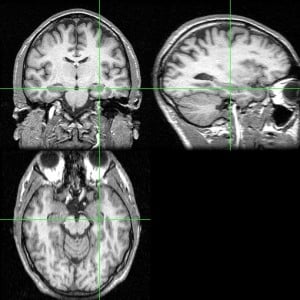 The science blogosphere has been awash this past week with articles exploring a link between depression and damage to part of the brain known as the hippocampus. News outlets, such as IFLS, are claiming that: “Depression Damages Parts of the Brain”. But, where does this assertion come from, is it really so cut and dry, and what impact will this research have on those currently living with major depression?
The science blogosphere has been awash this past week with articles exploring a link between depression and damage to part of the brain known as the hippocampus. News outlets, such as IFLS, are claiming that: “Depression Damages Parts of the Brain”. But, where does this assertion come from, is it really so cut and dry, and what impact will this research have on those currently living with major depression?
Firstly, as with many science news stories, the ideas discussed here are far from a new. What is new and exceptionally clever, is the way this study was performed:
As you might imagine, imaging the living brain is not an easy task and different researchers tackle this problem in different ways. This means that data analysis and imaging methods can vary a lot between research groups. Sadly, this lack of standardisation makes it hard to compare data across different studies, which limits the number of patients each study can look at. This is where this new work really shines. Through a massive international collaborative effort, this study has been able to standardise imaging protocols across a number of international labs. The study examines data from a whopping 1728 major depression patients and 7199 healthy controls, meaning that statistically these findings really pack a punch.
Their findings corroborate what other researchers already suspected – that recurrent depressive episodes seem to be accompanied by shrinking of a brain region known as the hippocampus. The hippocampus is best known for its role in memory formation, specifically in the conversion of new experiences to permanent long-term memories (think 50 First Dates or Memento). This region is arguably also integral to our sense of self. Without memories of our pasts how do we know who we are or what we want for the future? So, hippocampal damage could hold far reaching implications beyond that of simple memory loss and perhaps even contribute to many aspects of depression.
Now, the question scientists really want to answer is – what happens in the brain to cause depression? This study finds that hippocampal shrinkage is only significant in patents who have suffered from multiple depressive episodes, while patients who have only experienced a single episode have relatively normal hippocampi. This suggests that depression causes hippocampal shrinkage, rather than hippocampal shrinkage leading to depression.
Could this mean that we need to look beyond this brain region for the cause of depression?

It’s necessary to keep in mind that this work is not conclusive and may only represent part of a bigger picture. Large scale changes in the brain’s morphology, visible on MRI brain scans (as studied here), indicate significant cell loss. It is quite reasonable to assume that in the early stages of major depression, as with many long-term illnesses, changes in the body/brain may be more subtle – think alterations in brain chemistry and communication rather than large scale cell loss. So, although it’s useful to know that major depression can lead to hippocampal cell loss, we cannot yet rule this region out as a main player in the early stages of depression.
But, most importantly, will this research change anything for the >350 million people suffering from depression worldwide?
Well, actually this work feeds rather nicely into another hypothesis of depression known as ‘the neurotrophic hypothesis of depression’. In brief: It is known that stress and depression cause cell loss in limbic brain regions (including the hippocampus). Neurotrophic factors are proteins in the brain which encourage cell growth and multiplication, these are depleted in depressed patients and animal models of the disorder (often specifically within the hippocampus). Some scientists believe that a reduction in neurotrophins, such as BDNF (Brain Derived Neurotrophic Factor), begins a cascade which ultimately leads to cell damage and death. Therefore, it is possible that repeated episodes of major depression cause an additive loss of BDNF and perhaps subsequent hippocampal damage. Interestingly, a number of studies also suggest that antidepressants may increase BDNF in depressed patients, suggesting the effects of depression on the brain may be reversible.
So, it seems that when it comes to depression, scientists are slowly piecing together large parts of the puzzle. Although many uncertainties still exist (the brain is a tricky organ to understand), with continued research it is hoped that better treatments may be just around the corner.
Post by: Sarah Fox
We have examined this study in detail, and published a commentary in the same Journal (Molecular Psychiatry) that comes to a very different conclusion than the authors.
In sum, we simulated hippocampal volume data based on the sample and effect sizes reported by the authors. We find that the hippocampal volume differences are so small that knowing a person’s hippocampus size does not predict group membership much above chance (the discrimination accuracy is only ~52.6%). While the hippocampal volume is smaller in depressed patients than healthy participants, it certainly does not “robustly discriminate”. We also discuss why hippocampal volume may not be related to depression at all (for reasons such as lack of disease specificity and confounds), and even if it would be related, why it may not be reasonable to consider it a biomarker.
You can find the commentary here:
http://www.nature.com/mp/journal/vaop/ncurrent/full/mp2015199a.html
If you do not have access to the Journal, we have also uploaded a openly accessible version of the manuscript here:
https://figshare.com/articles/Fried_amp_Kievit/1549680/5
Eiko Fried
A motivating discussion is definitely worth comment.
I do believe that you should write more on this issue, it may not be a taboo matter but generally people don’t discuss
these subjects. To the next! Cheers!!
I?m impressed, I must say. Rarely do I come across a
blog that?s both educative and amusing, and let me tell you, you’ve hit the nail on the head.
The problem is an issue that too few people
are speaking intelligently about. I am very happy I came across this during my hunt for something relating to this.
Good article. I’m going through many of
these issues as well..
A lot of thanks for your own hard work on this website.
My daughter enjoys working on investigation and it’s easy to see why.
My partner and i notice all concerning the
powerful manner you make practical information via this
web site and therefore foster contribution from some
others on that situation while my princess is in fact learning a lot.
Take advantage of the remaining portion of the year. You have been carrying out a pretty cool job.
I know this web site provides quality based articles and
other stuff, is there any other web page which
gives these information in quality?
I am continuously searching online for ideas that can benefit me.
Thank you!